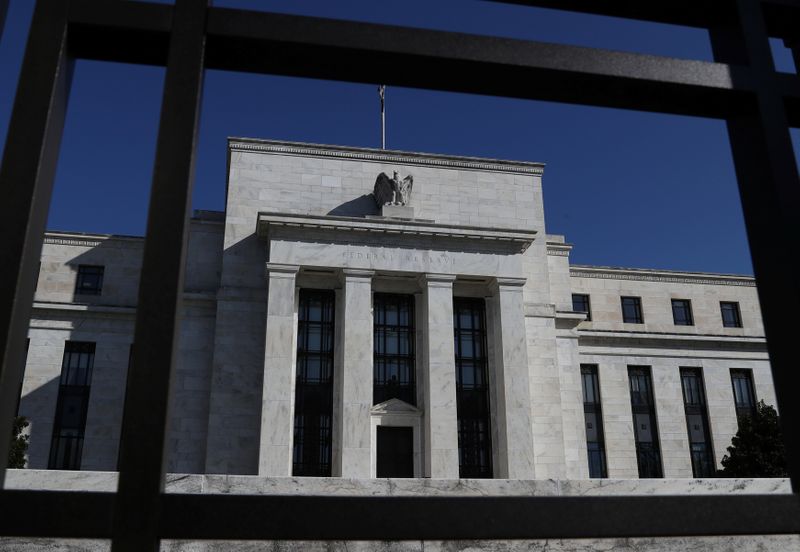By Jonnelle Marte and Heather Timmons
WASHINGTON/NEW YORK (Reuters) - The U.S. Federal Reserve unleashed new emergency measures on Sunday night to limit the economic harm from the coronavirus, including making it easier for banks to get money and slashing its benchmark borrowing rate to near zero.
In a move reminiscent of the extraordinary steps the central bank took in the 2007-09 financial crisis, the Fed will flood the financial system with cash to ensure markets keep functioning and banks have the scope to keep credit flowing to businesses and consumers during the growing number of shutdowns prompted by the outbreak.
U.S. consumer spending drives the world's biggest economy, accounting for about 70% of gross domestic product. While the Fed's moves impact banks and commercial borrowers most directly, they're also designed to keep U.S. consumers solvent and spending money, albeit indirectly.
Fed chair Jerome Powell conceded on Sunday there are limits to what the Fed can do for consumers directly.
"We don't have the tools to reach individuals, in particular small businesses and other businesses or people who may be out of work," Powell said during a conference call with reporters. "This is a multifaceted problem and it requires answers from different parts of the government and society."
Here's how the Fed's actions may help:
1. If you're an employee who is still working, you're more likely to get a paycheck.
No one knows how deep the financial hit from the coronavirus may be, or how long it will last. But with travel essentially stalled, airlines reeling, and cities shutting bars and restaurants, concerns are rising that big companies could be forced into bankruptcy.
The Fed's moves may make it easier for some companies to stay in operation and keep paying workers by expanding access to loans.
But some people have been laid off or have seen their hours cut over the past two weeks as typical economic activity ground to a halt. That's beyond the Fed's reach, as Powell noted, and they will need to rely on other parts of the government to help.
2. Mortgages will be cheap, possibly for a long time.
Mortgage rates, which are influenced indirectly by the Fed and investors' expectations for the economy, have fallen to record lows with the Fed's rate cuts.
Average 30-year mortgage lending rates for homebuyers with good credit have fallen http://www.freddiemac.com/pmms/pmms30.html from 4.46% in January of 2019 to 3.29% as of March 5. Sunday's move could lower rates even further.
The drop means that buyers will pay less, over the lifetime of the loan and people who refinance loans can shrink their monthly payment. At a 4% interest rate on a 30-year mortgage, a homeowner could expect a monthly mortgage payment of about $1,850 for a $350,000 home purchased with a 20% down payment, according to estimates from LendingTree.com, a housing website.
With a 3% interest rate, that monthly payment would go down to roughly $1,700. Lower rates can also give home buyers more purchasing power, making it easier for them to afford a more expensive house.
3. Loans should remain available.
The Fed's asset purchases are intended to keep lending markets from freezing up so that banks can continue to issue loans to consumers and businesses, Powell said Sunday. The substantial interest rate cut should also lower borrowing costs, bringing down the rates for many types of loans.
This could be helpful for businesses that need access to cash to keep their doors open or to keep paying their bills while they wait for activity to return to normal. But the lower rates may not lead to a surge in new debt, since consumers and businesses may stay cautious while they wait for business to return to normal.
"Reducing interest rates to borrowers will ease the burden of existing debts slightly," Greg McBride, chief financial analyst for Bankrate.com said in a statement. "But is unlikely to spur the usual surge of borrowing as consumers and businesses batten down the hatches for a coming drop off in U.S. economic activity."
4. Bad news for savers.
The Fed's move to cut interest rates to zero could mean a return to the rock bottom payouts on savings accounts that consumers became accustomed to after the financial crisis.
The central bank increased rates gradually between 2015 and 2018, giving savers some modest relief. But the Fed was only able to raise the top of its target range to 2.5% - or less than half their pre-recession levels - before it started cutting rates again in 2019 because of the trade war.
The most recent rate reduction should bring the interest paid on online savings accounts, certificates of deposit and other vehicles for stashing cash back down to near zero levels.
